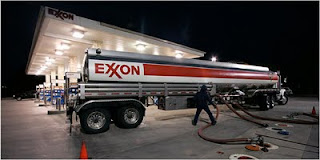 Exxon Mobil is the fusion of the heirs to the Standard Oil owned by John D. Rockefeller, created in 1870. By 1939 this company is the largest worldwide, and has only a rival to the SHELL that extracts oil from Mexico.
Exxon Mobil is the fusion of the heirs to the Standard Oil owned by John D. Rockefeller, created in 1870. By 1939 this company is the largest worldwide, and has only a rival to the SHELL that extracts oil from Mexico. The company is the second of the six global oil super majors with a daily production of 6.5 m boe (barrels of oil equivalent). ExxonMobil ranks first worldwide in oil and gas reserves between private companies producing oil, but not yet reached the size of some of the biggest oil producing state. Exxon was widely criticized for its record trade and environmental practices. History
Exxon Mobil Corporation was formed in 1999 through the merger of two major oil companies, Exxon and Mobil. Both Exxon and Mobil.
 In 1998, Exxon and Mobil signed in the U.S. an agreement for U.S. $ 73.7 billion to merge and form a new company called Exxon Mobil Corporation, the world's largest. Following approval for stock, the merger was completed on November 30, 1999. The merger of Exxon and Mobil was unique in American history, bringing together the two largest companies in the Standard Oil conglomerate of John D. Rockefeller's Standard Oil Company of New Jersey / Exxon and Standard Oil Company of New York / Mobil, which had been forcibly separated by government order the U.S. nearly 100 years earlier. As a result of the merger, held the largest corporate merger in U.S. history
In 1998, Exxon and Mobil signed in the U.S. an agreement for U.S. $ 73.7 billion to merge and form a new company called Exxon Mobil Corporation, the world's largest. Following approval for stock, the merger was completed on November 30, 1999. The merger of Exxon and Mobil was unique in American history, bringing together the two largest companies in the Standard Oil conglomerate of John D. Rockefeller's Standard Oil Company of New Jersey / Exxon and Standard Oil Company of New York / Mobil, which had been forcibly separated by government order the U.S. nearly 100 years earlier. As a result of the merger, held the largest corporate merger in U.S. history In 2005 the price of the shares of ExxonMobil rose in parallel with rising oil prices, surpassing General Electric as the largest corporation in the world in terms of market capitalization. In late 2005, it reported record profits in the U.S. reaching U.S. $ 36 billion in annual revenues, ie 42% over the previous year (total annual production of income was a record of all-time annual income of any business, and includes $ 10 billion only in the third quarter of the year, also a record of all time in a single room revenue annually in connection with any other business). The Company and the American Petroleum Institute, the main unit of U.S. oil lobby, tried to minimize this success in order to avoid criticism of the consumer by placing ads in major U.S. newspapers such as the New York Times and Washington Post, comparing oil industry profits of other major industries such as pharmaceuticals and banking. Safety and environmental
ExxonMobil was the biggest seller of oil to the Pentagon between 1999 - 2005, ie since he planned the invasion and subsequent occupation of Iraq. BP and Shell are now taking over as the main oil suppliers to the Pentagon. ExxonMobil is not only benefited from increased prices, but also by providing oil to the military to be occupying Iraq just to gain control of these same oil companies needed.
This close relationship between ExxonMobil and the U.S. government is a feature of the industry, as well as James Paul noted in a report by Global Policy Forum.
"Just as governments in the U.S. and UK oil companies need to ensure the fuel necessary for full global war, oil companies need from their government and its military power to secure control of oil worldwide and transportation routes. It is no coincidence, then, that the world's largest oil companies belonging to the most powerful countries ... "
In 2008, amid much controversy regarding the change of direction in favor of a more friendly practice environment, commissioned by the Rockefeller family, shareholders of the first company in the world by market capitalization (which only managed to overcome on occasion the giant Petrochina) rejected proposals by the Rockefellers.
None of the 17 requests backed by capital and the family were approved by the Board annually.






No hay comentarios:
Publicar un comentario